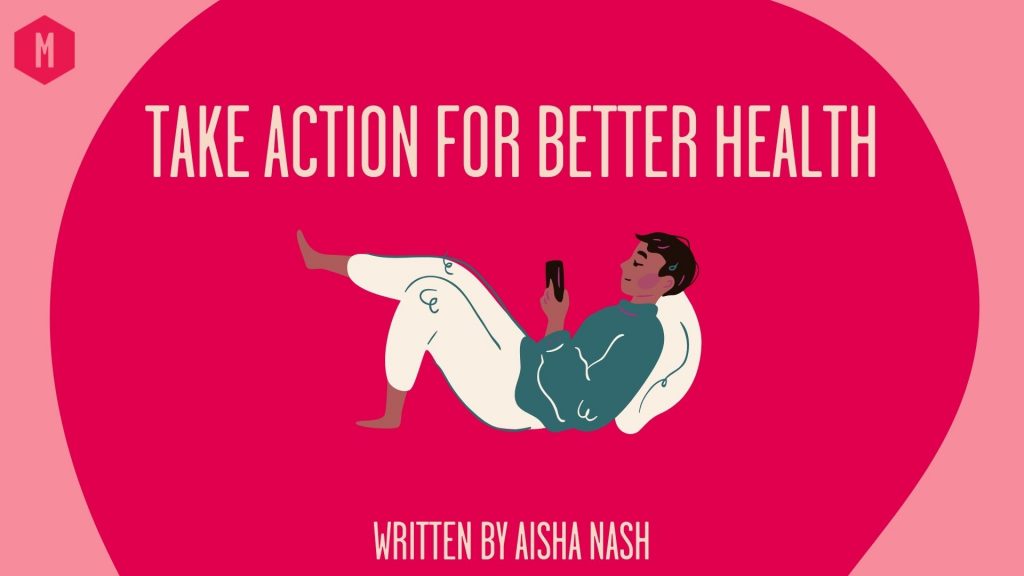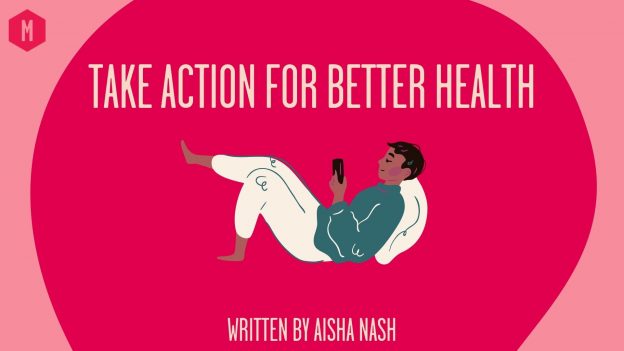
Diet Culture asks us to take things away from our life. Aisha Nash suggest taking action by adding in the things that enrich our lives and improve our health.
Take Action for Better Health
I wanted to invite you to take action for better health. After learning about the fallacies of Diet and Wellness culture, it can be quite common to feel disheartened. You can feel disillusioned by how little control we have over our health. Instead of mirroring diet culture and giving you more things to take away from your life, I wanted to suggest ways to add to your life .
In my previous article on how health and weight are different I wrote about how our health is a combination of many things. Our health is affected by our social circumstances, our genetics, but also our day-to-day life; how much we can avoid stress and how nutrient dense our food is, can help our health.
Social life and Mental Health
There are many parts of our lives and our social circumstances that can feel unchangeable; our social life can be a part of this, and it does affect our mental health. Especially living in a post-covid world, I know I am guilty of letting friendships slide because life gets in the way.
Today you can reach out to that friend whom you feel you’ve lost touch with. I know sometimes, when there’s been a long lapse, you can feel a mixture of apprehension and anxiety about reaching out. I sure did. However I promise your friends will be so touched and happy that you got in touch. I recently contacted an old friend from my university days, stating that I felt it had been so long since we last spoke. They were overjoyed and spent an hour sending me their new cat photos. Friendships are a two way street, and life gets in the way. Reach out and rekindle that friendship.
Building Community Support
You can also work on building a community of support within the people you know from social media. I know the media constantly puts out articles about the “dangers of social media” however, some of my closest friendships are with people I met through Instagram. Heck I met my husband through Tinder. In a post lockdown world, it is much easier to build friendships and community within social media, and you can take this further by joining or even creating support groups and networks, using facebook, instagram and other social media applications. One thing we have all learnt in 2020 is how it’s the community around us that gets us through this time, and these apps are generally free and easy to use.
Within the want to improve our health, we can sometimes get bogged down with all the details, due to the noise from the Wellness Industry. This can even make it hard when we want to increase our fruit and veg intake by giving us nonsensical arguments about toxins. This is another one of those snake oil situations, in which if they can convince you that the fruit and veg you have access to is not good enough, then they can easily sell you their overpriced highly processed powders.
Get your nutrients where you can
A great thing to help your daily health is getting nutrient-dense food, often in the forms of fruit, vegetables and oily fish. The source of these fruit and vegetables does not matter. Not all of us have access to organic farmer’s markets in which the veg is grown in the manure of blessed virgins, or whatever else the Wellness industry is peddling. There is close to 0% difference between organic and conventionally grown produce, and most of that difference is the price. It does not matter if the fruit and vegetables you consume are organic, conventional, cooked, fresh, raw, frozen, canned or pickled; what matters is that you eat them.
We are sold this idea of processed foods being bad for us, however the cooking of tomatoes within the canning process increases the bioavailability of some nutrients, such as lycopene. Frozen vegetables are often frozen at the peak of their freshness allowing for the most nutrients to stay within the veg. Pickled vegetables are often high in prebiotics, which is wonderful for the bacteria in your gut. Canned oily fish is almost always much more affordable and accessible than freshly caught. And to be honest, who actually has the time to go pick their own veg and catch their own fish in this day and age?
Superfood or super marketing?
From here we come to superfoods, one Google of “what is a superfood” leads to the rabbit hole of: quinoa, acai, maca, and all sorts of other overpriced and often not very tasty foods. You start replacing your rice with quinoa and millet; your coffee with mushroom powder; and your porridge with elaborately decorated smoothie bowls. None of these superfoods are any more nutritious than the foods you normally eat. They just have a rather talented marketing campaign behind them. And these marketing campaigns have a rather large human cost.
Since quinoa became an expensive Wellness industry trend, the people that survive on the crop within Bolivia and Peru can no longer afford their main source of nutrition, this is only one example, however it’s not just food that is being taken away from indigenous peoples, even their sacred medicine is being co-opted due to Wellness trends and a heavy dose of spiritual bypassing.
I can give you an example of a superfood from even before the term was coined. When I was little, we drank orange juice for vitamin C, that’s the thing my parents told me to drink whenever I had a cold. Later on through my degree I learnt almost all fruits and veg have vitamin C in them, many having a lot more than orange juice could ever contain, like capsicums (bell peppers), broccoli and even brussel sprouts. Yet you ask anyone on the street about vitamin C, they will always say orange juice and this is due to a marketing campaign that started in Florida when there was a glut of oranges in the 1920s. At the time Orange juice was marketed as a cure-all for everything, from the common cold to being single!
Movement trends or over-hype?
Let’s now go onto movement! One scroll through social media, YouTube, or to be honest even your local newspaper will be selling you the latest “must-do” movement. As you keep reading/scrolling through you’ll have discovered at least 30 or more “must-do” movements and activities. This can sometimes lead to feeling so overwhelmed that honestly it’s just easier not to do anything at all… Instead, know that just like superfoods, there are no super-activities or exercise; it is more about the small amounts of movement that are achievable and enjoyable for you. Your movement can be walking around your neighborhood; pacing up and down your living room; gentle Yoga on your bed; playing catch with children.
Focus on the small and easy actions
Let’s begin to take the focus away from who and what can sell us more products, and instead focus on the small, easy actions that we can add into our daily lives. There is no one magic bullet that will make you “healthy”, and to be frank, life would be quite boring if there was. Life is fun due to its multifaceted nature, and so is your health. Embrace the complexity and know that any small steps you take are truly worthwhile.
About Aisha Nash:

Aisha Nash has ‘lived the dream’ and been burnt by it as well as burnt out. She draws on her personal experience of pursuing her dream job as a pastry chef, grasping success only to discover that her physical and mental health suffered greatly. Aisha now teaches yoga; to help people discover who they really are and find comfort and joy within their own skin.





Leave a Reply